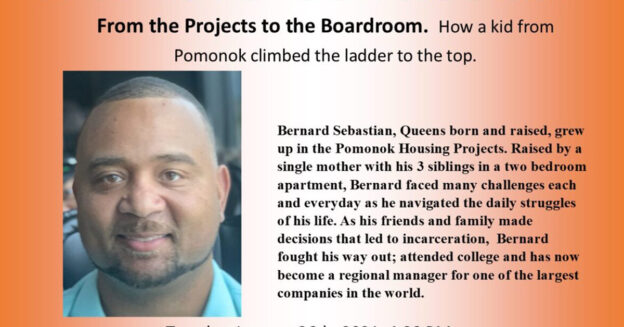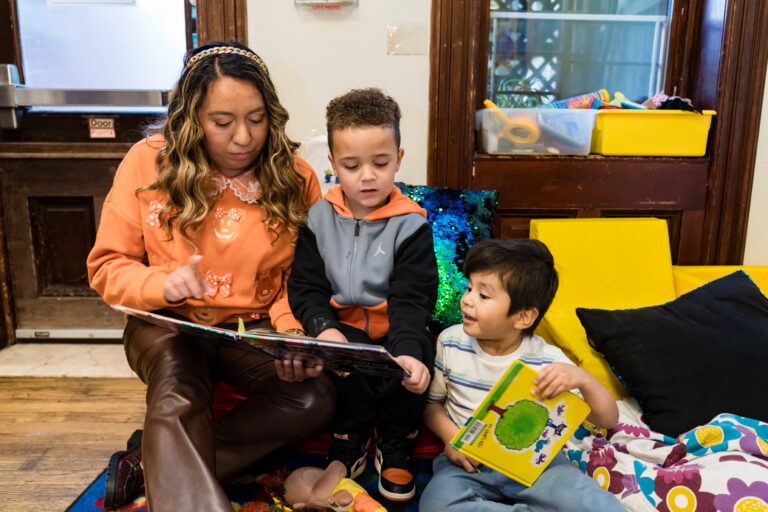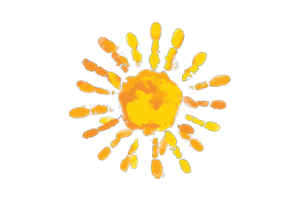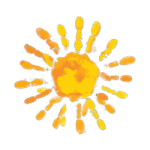A Parsons Beacon alumnus shares his journey
A core principle of The Child Center of NY is that connecting children with relatable role models helps them succeed. We constantly look for opportunities to expose our program participants to adults from their communities who have built fulfilling futures.
That idea was the impetus behind Parsons Beacon afterschool program’s “Just a Kid from Queens,” a virtual, interactive series featuring speakers who grew up in Queens and went on to do amazing and rewarding things with their lives.
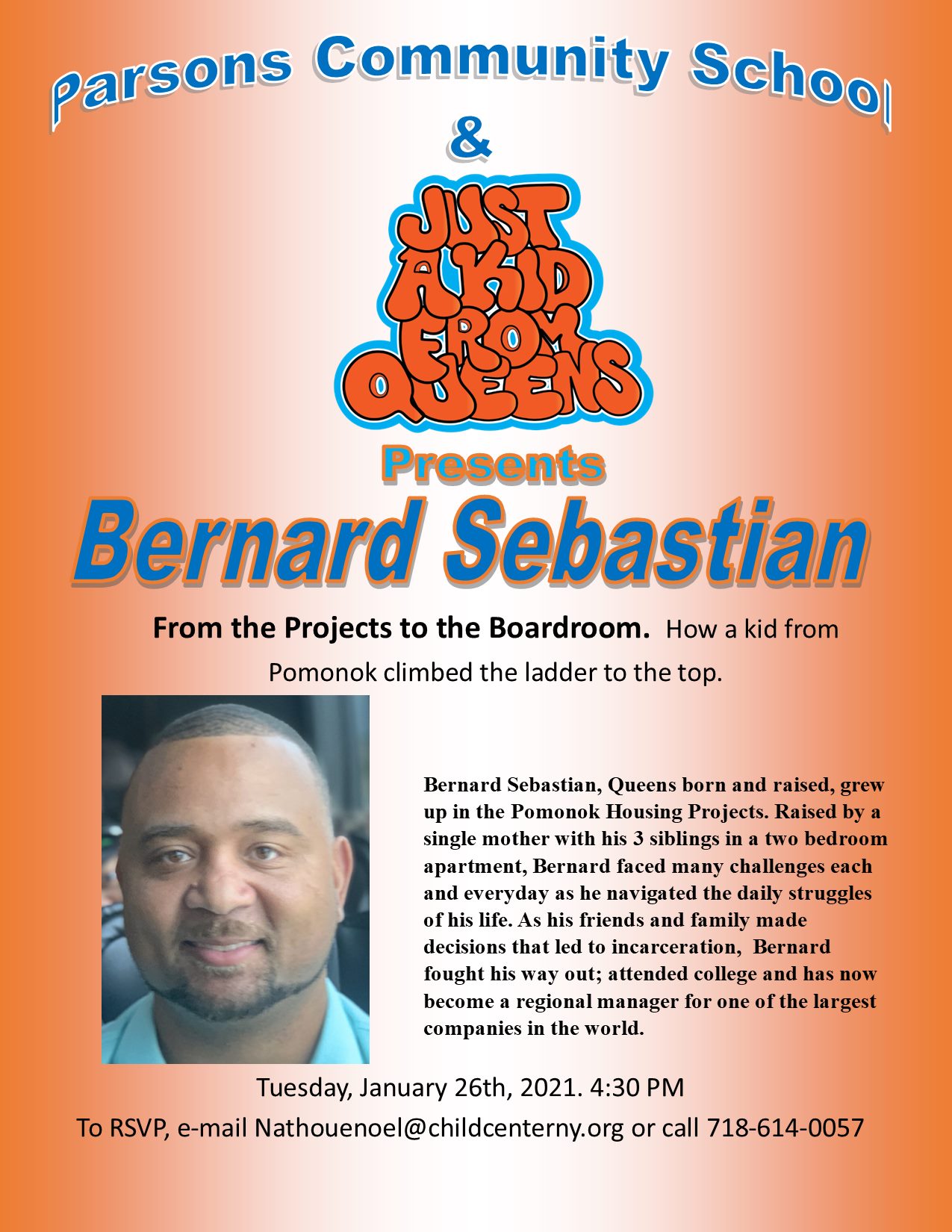
One speaker, Bernard Sebastian, was doubly relatable to our Parsons participants, as not only did Sebastian grow up in Queens, but he also was a participant in our Parsons Beacon program when he was a child.
Today, Sebastian is a John Jay College of Criminal Justice graduate and district manager for Starbucks in Tampa, Florida. Born and raised in Queens, Bernard grew up in the NYCHA Pomonok Houses, just a few blocks away from The Child Center’s Beacon program. Bernard faced many challenges as he navigated the daily struggles of his life; but he also had strong support from his community and the team at Parsons. Sebastian’s “Just a Kid from Queens” session focused on his roots and his time at Parsons, and on the concepts of leadership, cultural diversity, career readiness, and much more.
To learn all about how this kid from Queens became a district leader of one of the world’s biggest corporations, read our follow-up Q&A with him below.
What was life like for you growing up in Queens? What were the challenges you faced, and what were some of the wonderful things about your childhood and adolescence in the borough?
My childhood was no different from that of most of the people I grew up with. I lived in the projects with five people — my mother and three siblings — in a two-bedroom apartment. We were on welfare for most of my childhood while my mom attended school to become a teacher. There were a lot of times kids 11 and younger were left at home to tend to ourselves. Although we had some fun with my home being the place to be, looking back there were a lot of times we could have been seriously hurt or worse. With all that, I wouldn’t change anything about the way I grew up.
Growing up “in the hood” comes with its own challenges. You are conditioned to feel “less than.” Although some of it may not be intentional, it is still very real. Housing police, for one — having an entire police force dedicated to keeping the locals in line — that was a daily dose fear and many other feelings you could imagine. It also came from teachers, other adults, peers of all ages, and the surrounding businesses that loved the Black dollar but not so much the Black experience.
Still, I would be lying if I told you that it was all bad. Growing up with less than makes you look at what you do have and cherish it: the friends that quickly turn into brothers and sisters, for one; the “Old Heads” that were looking out for us, but we hated thinking they were just another authority figure trying to keep us in check. I wish I could go back and thank them now! Every time I was seen doing things that I had no business doing, some elder would go to my house and tell my mother. We had a real sense of community. I learned to be resilient, agile, tough, caring, and so many other things because of my community.
How did your experience as a participant at Parsons Beacon impact you?
I was a member of the Beacon from the start at Parsons, from ages 15-17, approximately 1997-2000. The Beacon staff were one of the first people to call me on my stuff! To name a few Deep [Ghosh] (the real OG); and Lenny [Blount, drug prevention counselor] and [Robert] Murphy [recreation counselor], both of whom sadly have passed away. Those three in particular contributed to my success as a functional member of society more than they will ever know. Deep in a nutshell can be summed up in one word: accountability. He took us in, gave me a job, and banned me from Beacon for a year (it was definitely warranted). Lenny talked to us real — like adults, not kids, and his words cut through us like a knife through butter. Murph … well, he was the cool dad you went to when the others gave you the cold shoulder. Looking back, I think they planned it. That “who’s gonna be the good cop/bad cop this year” conversation!
The best memories I have as a youth are attributed to the Beacon. The first trophy from a basketball tournament was from the Beacon. The Beacon was our neutral ground. I have been a youth football coach every year since 2009. The first time I coached was at a Beacon league when I worked there. I mentor opportunity youth today because of the people that had my back in the Beacon. I learned the consequences of street life through many things, but my year-long ban played an important part.
Can you share anything memorable that came out of your “Just a Kid from Queens” talk with current Beacon participants? Why did you decide to be a speaker?
The most memorable moment of my talk, hands down: the OG Deep joining the call and sharing an old picture. The fact that he still had it and knew where to find it blew me away.
The decision to speak was easy. I made it! If I am given the platform to help even one more person make it in life, I’d take the opportunity 10 times out of 10.
Can you describe what your life is like now? How did your experience at Parsons help you get to where you are, and how does it help you today?
My life is great. I have a family. My wife is my high school sweetheart and actually came to watch one of the basketball tournaments we played through Beacon. I own my home, and I am a leader of leaders, which is a fancy way to say I am a people development manager. My family takes yearly vacations, and, to be honest, I am further in life than I could have ever imagined.
My time at the Beacon is why I give back … because people like Deep, Len, and Murph gave back to me. Without them, I would have not known my capacity for good.
It is truly an honor and a privilege to be in a position to give back, to the very place that my journey started, no doubt.
Editor’s Note: See this Newsday article from 2001 about the beginning of our Parsons program, when Sebastian was among our earliest participants!
